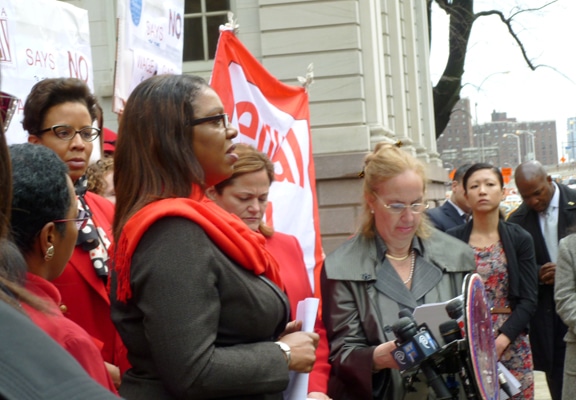
 Wage protest(1).jpg)
Photo by Crystal Lewis
NEW YORK (WOMENSENEWS)—Gathered on the steps of City Hall in a day with sunshine breaking through clouds a crowd of women wearing red called for a variety of ways to help women earn an equal day’s pay for an equal day’s work.
The speakers were New York City officials and leaders of women’s advocacies and they were wearing red on April 8, Equal Pay Day, to symbolize how far women, who earn about 77 percent of men in the same or comparable jobs, are “in the red” compared to men in terms of wages and earnings.
The women also hailed achievements. New York City this week enacted a paid sick-leave law and a pregnancy non-discrimination act that one speaker said that had already helped a worker in the Bronx gain restitution of her job as well as back pay.
Sonia Ossorio, head of New York City NOW, said women might as well “leave their jobs at 3:30 every afternoon.” That message is being carried by NOW’s campaign for Equal Pay Day: “Clock out at 3:00, Don’t Work For Free.”
Letitia James, the city’s public advocate, hammered a central concept: for the City Council to gain local control over setting the minimum wage in a city of almost 9 million where the vast majority of low-wage workers are women and costs of living are high. Currently the power to set the minimum wage is at the state legislature.
James declined to specify the amount of an ideal city-specific minimum wage but used the opportunity to push the idea of needing local control over the matter.
Gail Brewer, Manhattan Borough president, said “self-sufficiency” studies were underway in the city and that depending on the borough a female worker lives in she would need between $11.50 an hour and $15 to cover basic living expenses. Currently she said low-wage workers were spending about 50 percent of their wages on housing costs alone.
The speakers’ messages were echoed and amplified on social media where the hashtag #WithoutThePayGapIWould is going viral on Twitter. #WithoutThePayGapIWould is inviting women to share what they would buy or invest in if the wage gap didn’t hold them back.
Without the wage gap women would make $431 000 more over the course of their entire career. #WithoutTheWageGapIWould pic.twitter.com/pVNwzntKcA
— Elizabeth Plank (@feministabulous) April 8, 2014
#WithoutTheWageGapIWould “retire comfortably and ensure my kids will have the funds to attend college.”
NOW-NYC (@NOW_NYC) April 8, 2014
#WithoutTheWageGapIWould spend more time with my son #AR and had no second job.
Linda Anna-Sophia (@LAUTschrift) April 8, 2014
#WithoutTheWageGapIWould be able to pay off my student loans much faster and begin saving for my daughter’s education #EqualPay
— Estey (@Esteysilva) April 8, 2014
They also called for an end to the sub-minimum wage for restaurant workers, the vast majority of whom are women. The families of these tipped workers are three times more likely to live in poverty than families in the general work force, one speaker said.
Other remedies included making sure that companies owned by women and minorities get a bigger share of city contracts and women gain more jobs in the higher paying fields still considered non-traditional for women such as firefighting.
In a press statement released April 8, President Obama said he believes that ensuring that women earn equal pay for equal work is essential to improving the economic security of families and the growth of middle class and economy. As announced last week, the president is taking two actions to ensure equal pay between men and women.
Obama is signing today an executive order prohibiting federal contractors from retaliating against employees who choose to discuss their compensation and a presidential memorandum instructing the Secretary of Labor to establish new regulations requiring federal contractors to submit to the Department of Labor summary data on compensation paid to their employees, including data by sex and race. According to the press release, the Department of Labor will use the data to encourage compliance with equal pay laws and to target enforcement more effectively by focusing efforts where there are discrepancies and reducing burdens on other employers.
On April 7, Maryland joined Connecticut in raising its wage to that $10.10 hourly level, the New York Times reported.
Would you like to Comment but not sure how? Visit our help page at https://womensenews.org/help-making-comments-womens-enews-stories.
Would you like to Send Along a Link of This Story? https://womensenews.org/story/equal-payfair-wage/140408/big-apple-women-push-get-out-the-red

